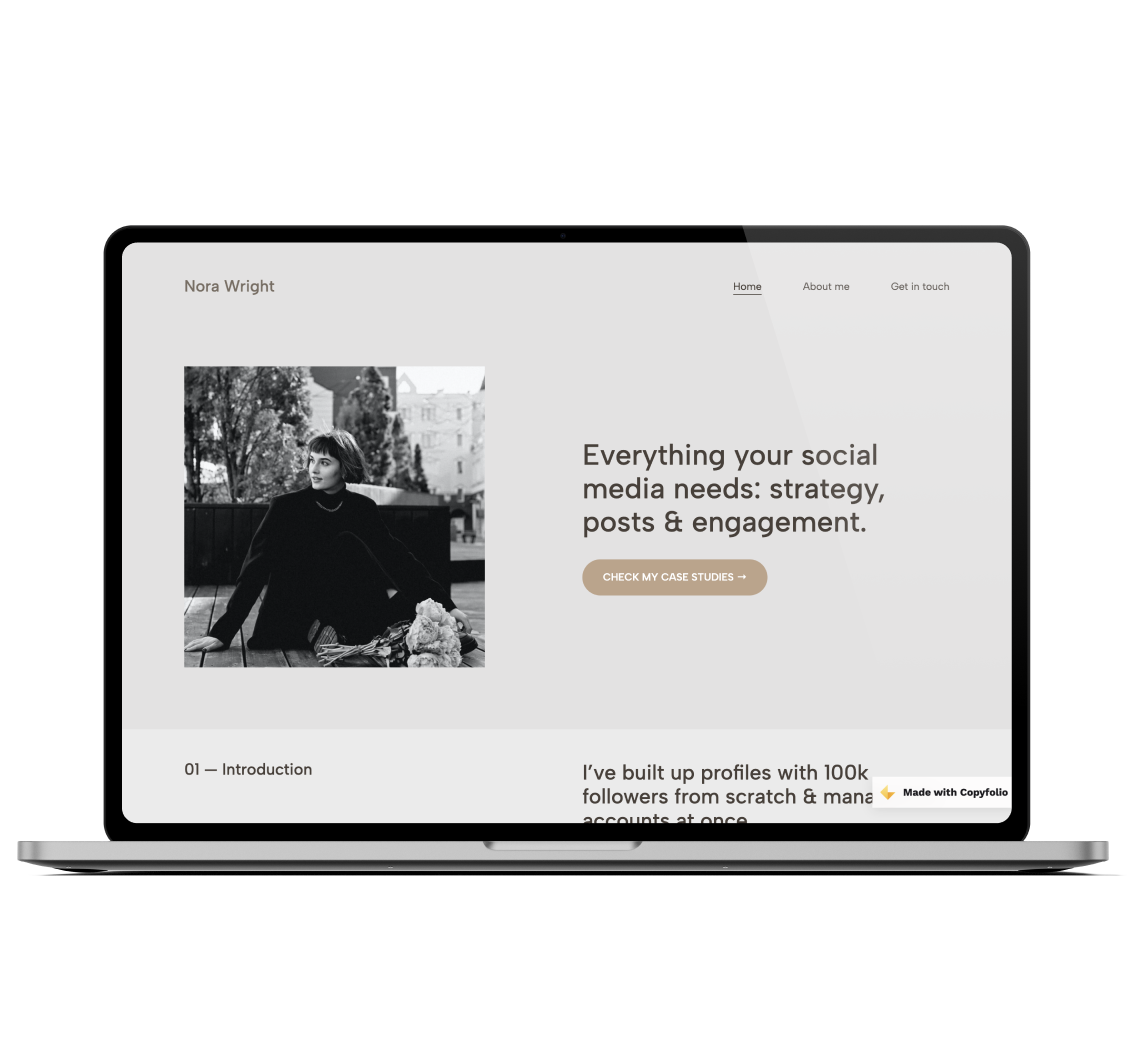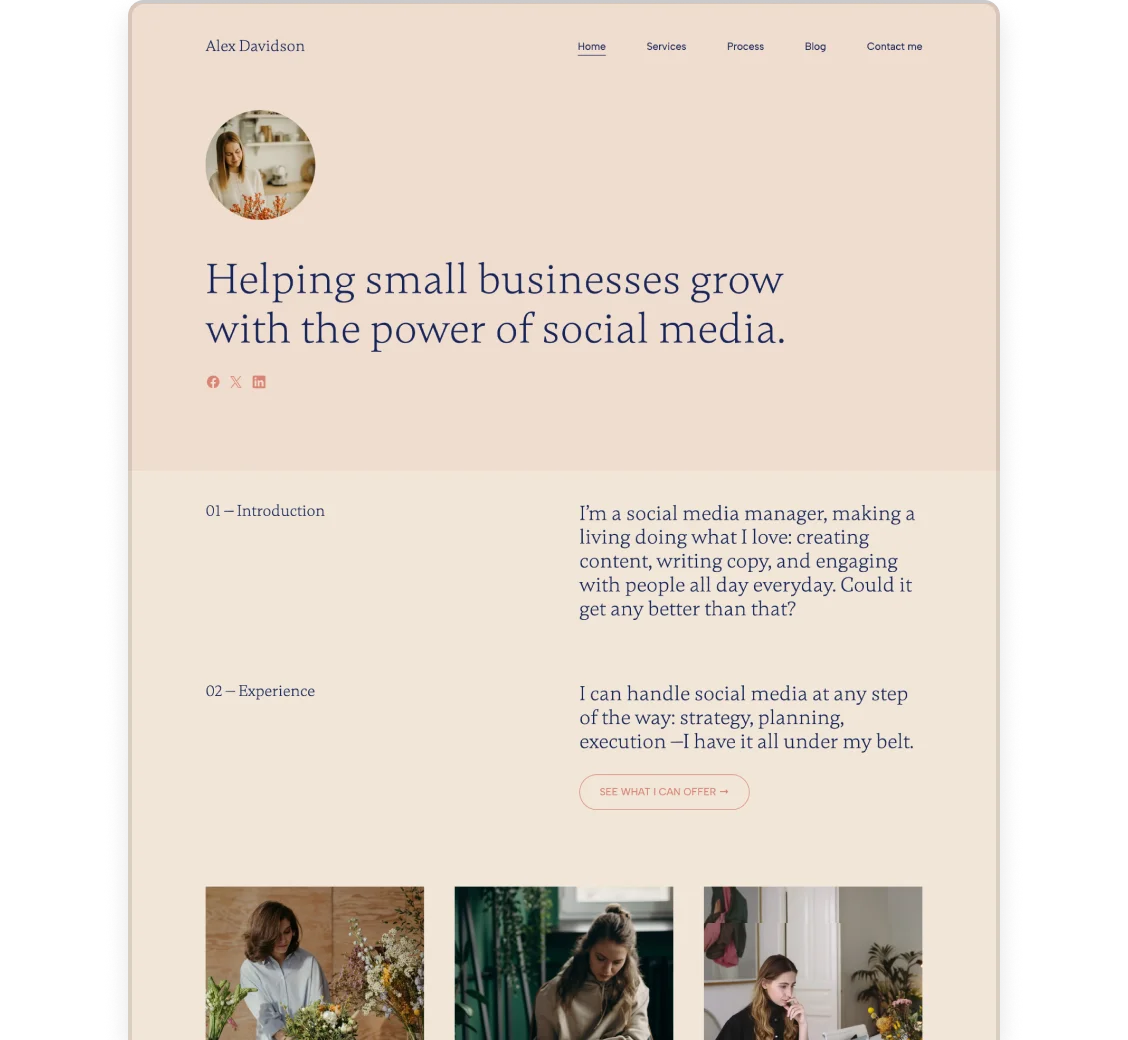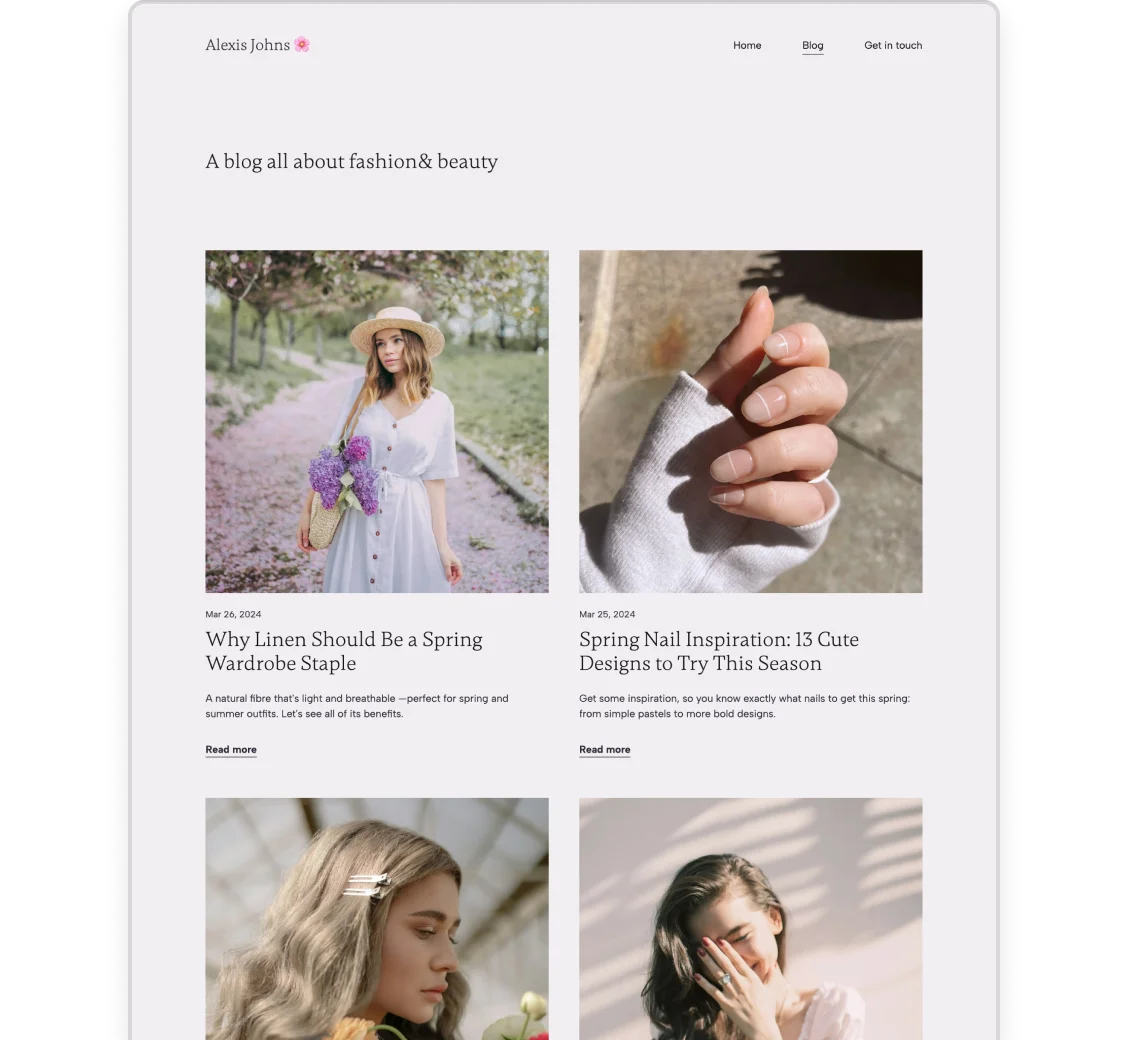Branding Essentials: Digital Presence for Freelancers & Professionals
It’s a misconception that only companies and brands need to be visible online. For a growing career, a strong digital presence is essential for individuals too. As a freelancer, it can help you land new clients. As someone working in-house, it can bring better job opportunities and bargaining power in salary negotiations.
But with most guides and articles written for brands around this topic, it’s hard to make sense of it and find actionable tips as an individual, for your personal brand. That’s why this blog post was written, to help you establish a strong online presence and watch your career flourish.
The elements of your digital presence
Let’s see what platforms and instances make up your digital presence first. Then in the next section, we’ll talk about what you can do with each to maximize your visibility and boost your online presence.
1. Your social media accounts
These days one of the easiest ways for people to discover you and hear from you is through social media.
So it’s no surprise that your social media accounts and the content you share on them are some of the most important cornerstones of your digital presence. Generally, the more impressions you get and the more people you reach, the stronger your presence is.
2. Your website
The other important cornerstone of your online presence is your own website. Whether you’re a freelancer, or a professional working in-house, your professional website is your online hub for all things “you”.
This is what people will find first when they Google you, and where they’ll go for any information: your contact info, work history, updated bio, top projects, services, and more.
If you don’t have a website, it’ll significantly weaken your presence. And if you have a bad one, it’ll add to with your presence but might ruin people’s perception of you and your personal brand.
3. Your blog
It might be part of your website, a substitute for it, or a totally separate entity, but a blog serves a similar purpose. Creating a blog is a great way for people to find you through organic search or platforms like Pinterest.
And it not only will put you in front of others but will do so in your chosen niche specifically. So they will recognize both you and your expertise —which is exactly what you want when you work on your professional online presence.
4. Groups and forums
Next up are groups and forums. That includes platforms like Reddit or Quora, as well as places like Facebook groups or LinkedIn groups.
As people often trust content by brands less and less, they turn to groups and forums for more reliable information and first-hand experiences from other users.
Although your interactions here might not be about directly promoting your skills and expertise, joining discussions, and answering questions will still put you in front of people, thus strengthening your presence, brand identity, and visibility.
5. Other people’s social media pages and profiles
This might sound strange at first, because how would other people’s pages and profiles have an impact on your digital presence? There are two ways, so let us explain.
First, your interactions with other people’s content are parts of your online presence.
If you’re active, constantly engaging with people’s posts, liking, commenting, and sharing, people will start to notice. They’ll remember your profile picture and username and will slowly get familiar with your views and personality.
Secondly, when people feature you in their content, that also becomes part of your digital presence. That content is yet another chance for others to hear about you, despite it not being created and shared by you, on your profile.
6. Other people’s inboxes
Believe it or not, it’s not only the publicly visible appearances that count towards your digital presence. Popping up in someone’s inbox, whether through your own newsletter or email or being featured in someone else’s is also part of it.

7 tips to boost your online presence as an individual
Now that you know what activities and platforms contribute to your digital presence, let’s see what you can do for each to maximize your visibility.
A quick note: while most other articles write their advice for businesses, we’re focusing on individuals: both freelancers and professionals working in-house or in agencies.
1. Create a website & run a blog
Thinking about some of the above-mentioned essential elements of your digital presence, our first tip is to create a website if you don’t have one already. Here’s what to keep in mind when you build or update your website:
- Make sure the top of your homepage is impactful: write a strong tagline, highlight your USP, and potentially add a photo of yourself
- Showcase your career highlights, top projects, and services if you’re a freelancer
- Get a custom domain for the most professional online first impression
- Make it on-brand: use fonts, colors, and images that go with your personal brand, keeping it consistent with the rest of your digital appearances
- Optimize for SEO: fill out all of your meta titles and descriptions and write all your pages with important keywords (e.g. your name + profession + services, like “Bella Jones UGC creator services” for your services page)
Speaking of SEO, the best way to help people find you organically is by writing a blog and optimizing each post for search engines.
How to run a successful blog as an individual
Did you know that in 2025, doing the basic “fill your metadata and add keywords” that we mentioned above is not the most important aspect of SEO anymore?
If you want to create a blog that does well in search and brings your traffic organically, you need to first and foremost create unique posts and bring real value to your audience.
That can be your unique opinion on certain topics or sharing your personal experiences. It could be witty copy and entertaining stories, or even results of research and analysis you’ve done.
But your blog posts should not only bring value but should be easy to read. That means both your tone of voice and writing style (feeling that it’s written for humans and not algorithms) and the way a post looks and is laid out.
Finding a blog and website builder like Copyfolio will help a ton with the latter. Things like font sizes, line spacing, and white spaces are set at an optimal level for you —and your whole site will be automatically responsive too. No more worrying about the technical details.
Thirdly, you gotta keep posting consistently. It’s not only the algorithms that will love you for that but your followers too. If someone’s already noticed your blog and enjoys reading it, seeing new content from you regularly will keep you at the front of their minds.
2. Post consistently on social media
Having read the beginning of this blog post it will come as no surprise that one of the recommendations is to post consistently on social media.
As your own social media accounts are one of the most important pillars of your digital presence, constantly putting out new and updated content is a must. It’ll help show people already following you that you’re still active and one to look out for.
And of course, if you do it well, new people will find you too. Your posts might show up on their For You or Explore pages, they could stumble upon you via hashtags or searches, or they might see your content shared or sent to them by others they know.
3. Engage with others on forums and socials
Your presence on social media doesn’t stop with posting on your account though. If you want to be visible, you should be engaging with the content of others too.
Find people in your niche: other freelancers and professionals, even brands that are related to what you do and post about. Follow them, take some time to go through their new posts regularly, and don’t be shy to comment.
Of course, by that, we don’t mean to comment anything randomly just for the sake of it. But if you can offer insight, start a conversation, or share your opinion, do so!
You could also consider resharing the best pieces of content you find. Their original creator might notice and your followers will also appreciate. They might even come to think of you as someone to come to for the best, curated content in this niche.
If you're struggling to keep track of all the pictures to reshare, you can always use an image management tool to keep them nice and organized.
4. Run some online ads
You might have heard that although it’s not impossible to be successful on social media organically, it’s much much harder than it used to be. Add on top of that the constant Google algorithm updates, and you’ll have your work cut out for you.
So to boost your reach and visibility, consider running some online ads. Think of ads like:
- Google Ads for your best blog post that’s having a hard time ranking organically
- Boosting a LinkedIn post that has a specifically high engagement rate
- Running Instagram or Facebook ads that introduce you and your content the best
- TikTok ads with a great hook that’ll make people follow you for more
Since the main aim here is strengthening your digital presence, showcasing your brand identity, building your brand awareness, and reaching as many people as possible is the goal here. So keep that in mind when you set up your ads (and their goals).
5. Start your own newsletter
As we said, it’s not only the publicly visible platforms that count towards your online presence. Being actively present in someone’s inbox is definitely yet another part of it.
One way to achieve that would be sending outreach emails: to other professionals asking to connect, or potential clients for a collaboration. But doing it this way is very time-consuming —to the point where it might not be even worth it, just for the sake of your digital presence.
One way of making it faster and easier is by starting a newsletter. You can collect people’s email addresses on your website and blog (or even in social media dms), and subscribe them to your emails. Don't forget to validate your email list with email verification software before sending!
You’ll then only have to write the email once and you can automatically send it out to all of your interested contacts. As long as they don’t get spammy and provide value, whether it’s news, entertainment, or education, they’ll be a great boost for your personal brand.
6. Try to get reviews and UGC
Now this sounds like a tip for traditional businesses and not individuals but hear us out.
Just because you’re an individual freelancer or a professional working in-house, it doesn’t mean reviews and even UGC wouldn’t be great assets to proper your career forward.
Freelancers can also create Google My Business and similar profiles, which show up when people search for talent to hire for projects. Similarly, you could always improve your LinkedIn profile with recommendations from previous colleagues, managers, and even clients.
And what about UGC? What does that even mean for individuals?
Whenever a colleague or brand posts on social media, mentioning and tagging you, especially in a professional capacity, it’s UGC for you. You’re not sponsoring them to do it, but they tell others about you, authentically recommending you, your skills, and expertise.
You can always nudge people and even companies you worked with to share stories about your time working together. If you have a great picture or video illustrating it, send it over too!
And when they share it, you can of course reshare it on your own profiles. But it’ll come across as authentic rather than self-promotional, since you weren’t the one originally publishing the post.
7. Work with affiliates or influencers
Okay, this last tip might not be relevant if you’re working in-house, unless you’re preparing to launch your business on the site, doing hard-core personal brand building.
But even as an individual, especially if you’re a freelancer, you can work with affiliates or influencers. Just because it’s not physical products that you sell, other people can recommend you to their audience, in exchange for a commission or payment.
As long as you find people who share the same target audience, these campaigns can be just as successful for your freelance business as an ad campaign on Instagram would be.
FAQ on digital presence
In short, it’s how and how much you appear online. It includes your complete digital footprint plus the likelihood of someone stumbling upon you and your content. The easier they find you, even without looking, the stronger your digital presence.
One of the keys to finding new clients and nurturing existing ones for freelancers is utilizing their digital presence. Having an SEO optimized website and well-performing, informative, and entertaining social media content helps potential clients find them; while constantly updating their pages and engaging with people helps maintain a good relationship with current ones.
Yes. Having a strong digital presence means more networking opportunities, a bigger chance for recruiters outreaching to you, and landing better-paying positions higher on the career ladder. A personal brand with a solid online presence makes all the difference when it comes to career advancement these days, even if you work in-house.





